Sunday Feb 15, 2026
Sunday Feb 15, 2026
Thursday, 5 January 2023 02:26 - - {{hitsCtrl.values.hits}}
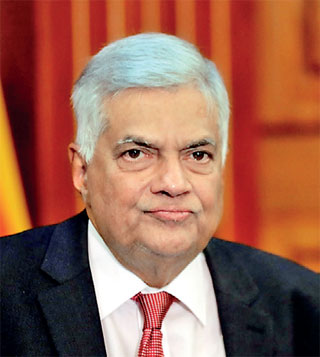
President Ranil Wickremesinghe
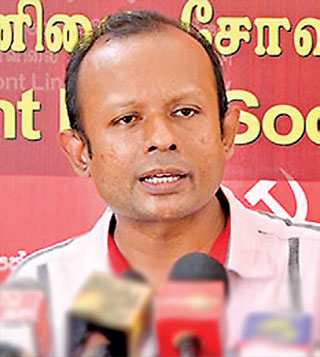
Pubudu Jayagoda
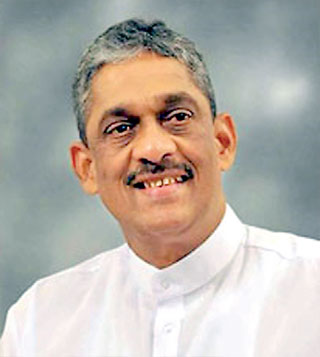
Sarath Fonseka
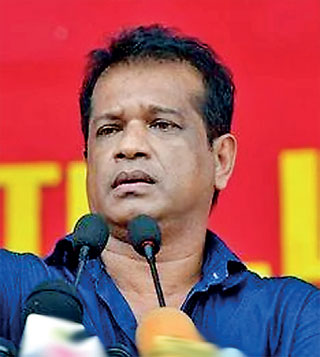
K.D. Lalkantha
|
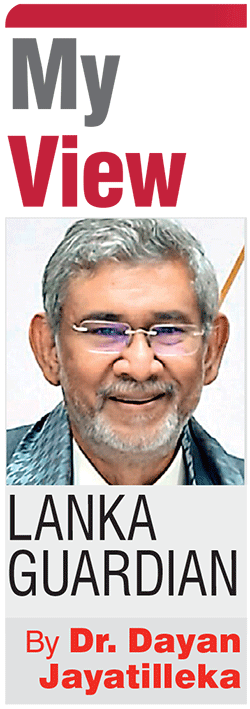
Never in Sri Lanka’s political history has something so small had potentials and implications that are so big. I refer to the news we are all awaiting, or should be, this January. That is the definitive signal of the holding on schedule of the local government elections, or conversely, of their postponement.
The local government elections are known in this country as “punchi chandaya”, the “mini-election”, because the unit involved is of relatively modest size as is the impact of the outcome—governments and national leaders do not change.
However, if the incumbent regime blocks the holding of the ‘mini-election’ on schedule, it will have ‘maxi’/‘macro’/‘mega’ consequences. It will shake the entire political system. It will shape the island’s destiny and the lives of its citizens.
If it is confirmed this week that the election will irreversibly be held by March, then the country is in the clear, politically if not economically —or more accurately, politically and therefore, eventually economically. There will be renewed credible hope that the cycle of elections commencing in the first quarter of 2023 will flush the waste-matter out of the system and after an electoral catharsis, allow the country to re-balance, re-stabilise and battle the economic crisis.
On the other hand, if there is no positive confirmation in January, then it will be a whole new ballgame. The inevitable conclusion will be drawn that if the unelected ruler is afraid of a local authorities (municipal level) election, then he and his Cabinet will be even more terrified of high-stakes national-level elections, i.e., presidential and parliamentary, will prevent their holding, and must therefore be overthrown so that the country can, in its 75th year of Independence have a leader chosen, elected, by the people and be governed by the people’s consent.
The authoritative political column of a leading Sunday newspaper signalled the regime’s intention to forestall the mini-election.
‘…Though he will formally announce the date for the local polls, in keeping with a statutory requirement, Election Commission Chairman Punchihewa has admitted to the prospect of a postponement of the elections if Parliament so decides...if the legislation is introduced before the SC concludes its sittings, the prospect of a postponement is almost a certainty.’
This would be the biggest single mistake the Wickremesinghe-Rajapaksa administration could make—one it is unlikely to survive politically.
Elections and revolutions
The newspaper Aruna quotes President Wickremesinghe warning the government parliamentary group that “if the local government election is held, a revolution will result”. He was referring, inter alia, to expenditure and resultant shortages. He has it upside down. Non-holding of the scheduled election will cause ceaseless outpouring of public protest led by the mainstream Opposition—SJB and JVP—including in Colombo, which will doubtless be met with repression. However, these parties are far too big to suppress. The inevitable dynamic of polarisation will hardly enhance stability, tourism, recovery and the Government’s standing in international negotiations. President Wickremesinghe will find the country ungovernable and his incumbency may not last the year 2023.
If the re-opening of political space is blocked, hope of a peaceful electoral expression of public opinion at a municipal-level election will be extinguished. Where hope dies, anger begins and soon blazes into rage.
A movement, struggle or cause which resorts to rebellion when there is an option of a peaceful election, forfeits legitimacy. The flip side is also true. When a regime blocks elections it loses legitimacy. Then, revolt, rebellion and even revolution gain legitimacy.
The matter goes even beyond that of legitimacy. If a ruler and regime sow a reasonable doubt as to whether the citizenry will be able to exercise its franchise and thereby its sovereignty, then rebellion not only becomes legitimate, it also becomes logically necessary; even imperative.
When elections are taken off the table, revolt, rebellion, revolution are infinitely more difficult to cope with and contain than when the electoral spin cycle of the System is manifestly functioning. When the electoral mode is disabled or suspended, the system tends to overheat, explode/implode.
Crisis by the right, of the right
2023 is also the year in which it becomes apparent which of the three political tendencies-cum-projects, the Right, Left and Centre, is going to prevail; lead the country in 2024/5.
The Right is represented by the regime led by President Ranil Wickremesinghe and supported by those who selected him—the SLPP dominated by the Rajapaksa clan.
The Left has two tendencies which compete for the most part but also converge in action sometimes. These are the Janatha Vimukthi Peramuna/Jathika Jana Balavegaya (JVP-JJB) and the Frontline Socialist Party (FSP).
The Centre is dominated by the Samagi Jana Balavegaya (SJB) the largest Opposition party, but also contains the Freedom Peoples Congress (FPC), the Sri Lanka Freedom Party (SLFP) and more fuzzily, the Uttara Lanka Sabhagaya (ULS).
Of the three, the Right is at a clear disadvantage. The world over, rightwing economic and political policies are welcomed and succeed when they are antidotes to a mess created by a left or centre-left government. 1977 is a Sri Lankan example. That is manifestly not the case here—which is something Colombo’s economic rightists including those in the main Opposition have yet to realise.
Gotabaya Rajapaksa was a Trump-Netanyahu Rightist. Ranil Wickremesinghe was Gota’s pick as PM and the Rajapaksa family’s as President. All these elements were/are pro-George Bush and pro-Trump.
The economic crisis is a product of the neoconservative/neoliberal right:
(a) Rightwing economic policies—e.g., scrapping of exchange control regulations and substitution by excessively liberal ones (2017) and heavy borrowing from the private money markets (2010-2019).
(b) A pair of successive pro-US Republican rightwing governments (Ranil 2015-2019, Gotabaya 2019-2022).
(c) Currently, a neoconservative rightwing fusion administration (Ranil’s presidency, Gotabayan Cabinet).
In this current period of world history, dozens of rightist administrations adopting neoliberal shock therapy have been toppled, electorally defeated or peacefully dislodged/replaced. Obsolete rightist economic dogma plus the glaring fact that Ranil is an unelected ruler vastly diminish his chances.
Centre vs. left, left vs. left
The Ranilist-Rajapaksaist Right is not a viable contender in open political competition, though it poses the danger of bloody tyranny, which is doomed to be short-lived and deposed by the masses due to economic damage and pain.
The real political competition in Sri Lanka is primarily between the Centre and the Left, and secondarily within the Left itself. The world over, the longer the delay in holding elections, the more the left is favoured because moderate political centrism’s mode of existence is purely electoral while the left usually spearheads the street-fighting against neo-liberal rightwing authoritarianism.
If, however, as in the fight against Ferdinand Marcos in the Philippines, it is the liberal-democratic populists who are the leading and main force in the anti-autocracy struggle, then it is the progressive centre rather than the left that prevails. In Sri Lanka, that’s the SJB, FPC and SLFP.
The JVP-JJB is behaving in the most puzzling manner. In the face of renewed evidence, this time from Nepal, that a convergence of the divided Left is a precondition for national political success (ex-Maoist guerrilla leader Prachanda has reconciled with the UML and assumed the Prime Ministership), the JVP continues to go it alone.
A JVP-FSP realignment would not only unleash great motivation among the youth, but also impact the middle-class professionals. For instance, Pubudu Jayagoda, the educational Secretary of the FSP (and earlier the JVP), is the most informative and intelligent, critical yet civilised voice on public affairs in the mainstream Sinhala-language media. A JVP-FSP ticket with Jayagoda on it would pull in considerable votes for a unified Left slate, but the JVP recoils from a left coalition as if it were kryptonite.
Furthermore, the JVP-JJB’s slogan against 74 years of rule since Independence and all those who were associated with governing during those 74 years, diffuses and defuses blame, diluting the concentrated indignation necessary to overthrow the incumbent and the political status quo.
The JVP and FSP must remember that ‘The (74-year-old) System’ is an abstraction, the enemy is concrete. Nobody successfully rebels against a system as such; they rebel against and depose a visible enemy from power.
The competition within the Lankan Left as to who will preponderate in significance, the JVP or the FSP, will depend on whether the LG election is held soon or is obstructed. If the former, the JVP-JJB will remain dominant. If the latter, the FSP will be determinant.
The JVP-JJB thinks that one election will trigger a chain reaction of elections which will democratically change the government and put in place a people’s administration which will be a fresh start for economic recovery. They add that it may take one more major, convulsive heave of people’s power by the citizenry to achieve this.
The SJB thinks much the same, except it regards itself as possessing the expertise and experience to manage the macroeconomy, the Premadasa perspective to protect and uplift the people, and a fresh image to secure the necessary external support.
The FSP thinks that all this is well and good but that it will be the same old game of musical chairs resulting in no qualitative gain for the people unless and until a strong movement of struggle by the people, a second –economic—Aragalaya, is unfurled and culminates in the establishment of a participatory direct democracy grid parallel to the Parliament.
Running beneath and through all three schools of thought—JVP, SJB, FSP—is yet another idea, a fourth notion that is occasionally voiced by Field Marshal Sarath Fonseka of the SJB and K.D. Lalkantha of the JVP-JJB. Their argument is that there is no ‘elections vs. Aragalaya-2’ contradiction. Elections are indeed the best path but this preferred option may not prove available due to regime obduracy. Therefore, it will take another, but better strategised, structured and led Aragalaya to secure one.
|
Hunger and Hard Revolution
George Pelecanos, one of my favourite authors in my favourite sub-genre of fiction, American ‘hardboiled’ (my favourite genre being the inclusive category ‘hardboiled/noir’) wrote a book called ‘Hard Revolution’. In January we shall know whether the Sri Lankan prospect for 2023 is a transition to a soft landing or a ‘hard revolution’.
Gotabaya Rajapaksa’s fertiliser insanity left his and his family’s home province, the South, in a state of semi-malnutrition. With the World Food Program’s statistics showing the percentages of food insecurity as 48% in the Southern Province, 45% in Sabaragamuwa and 43% in Uva, averaging at 45.33% in the three provinces put together, clearly the biggest objective condition for revolution exists: hunger.
On President Ranil Wickremesinghe’s watch, matters are on a disastrous continuum:
“Four in every 10 households in Sri Lanka experienced a reduction in their incomes from June to December 2022…a Food and Agriculture Organization (FAO) report said.”
Almost everything depends on whether or not elections can be held swiftly enough to outrun the galloping hunger. If yes, the hunger of the people will take the peaceful path of manifestation, starting in March 2023 and ending in 2024-5 with a leftward shift electorally—a shift to the centrist SJB would constitute a (comparatively) leftward shift from the Rightist status quo.
If local government elections are postponed, the massive, unprecedented food insecurity of the masses combined with heavy taxes on the educated will prove Lenin’s and Mao’s dictum that “a single spark can start a prairie fire”.
The Sri Lankan military will then have to decide whether it wishes to wage civil war against the people it is sworn to defend, in areas and against peasant communities from which its soldiers come—and whether it wants to do the killing on behalf of a narrow bloc comprising an unelected ruler who wishes to hand over the land and state assets to foreign and local companies buttressed by a family-based oligarchy which has reduced the historic areas of Sinhala resistance and rebellion to a state of semi-starvation.
Why I am sceptical
‘Pessimism of the intellect, optimism of the will’ a line by French writer Romain Rolland, was Antonio Gramsci’s choice of quote for the masthead of his newspaper L’Ordine Nuovo.
I’m afraid I don’t, can’t, trust President Ranil Wickremesinghe to do the right thing by democracy, the country, the citizenry or even himself. My scepticism turned pessimism due to two recent symptomatic events.
Firstly, on a visit to Ella, President Wickremesinghe was rude to an affable young official who was enthusiastically trying to explain an idea of cropping the grass of the hills in the shape of a giant tea-pot. With the cameras rolling, Ranil snapped at him: “I said ‘NO’ and when I say ‘NO’, there’s no further discussion; that’s the decision!” That sounded vintage Gotabaya “what I say is the official circular” Rajapaksa. Remember him, anyone?
Secondly, as the Daily FT reported:
“President Ranil Wickremesinghe yesterday instructed the Nuwara Eliya District Secretary and Commissioner to immediately provide 30 acres of abandoned land adjacent to the Ambewela Farm to develop it as grazing land to meet the food requirement of the dairy cows. President Ranil Wickremesinghe issued these instructions during an observation tour of the United Dairies Lanka Ltd., which belongs to the Ambewela Farm Group…President Ranil Wickremesinghe also inspected the 30 acres of abandoned land in the vicinity of the Ambewela Farm...”
I drink Ambewela milk, but this is outrageously cavalier conduct even an elected president would not engage in, short-circuiting all procedure. As another newspaper, and TV news, reported:
“Former Election Commission member Prof. Ratnajeevan Hoole has criticised the manner in which President Ranil Wickremesinghe ordered the release of 30 acres of land without following proper procedures. An arbitrary decision by one man to hand over state property amounted to abuse of power, Prof. Hoole has said.”
These incidents do not inspire confidence that a rational actor who recognises limits and his own limitations is making the executive decisions. Without a rational actor you can hardly expect rational political choices and outcomes.
I cannot trust the instincts, judgment and ‘sense of reality’ (Sir Isaiah Berlin) of a leader who has neither won a popular mandate nor leads a socially-immersed, nationally-representative party which is a massive feedback mechanism (that includes the ruling parties of China, Vietnam and Cuba).
Aged 25, I returned to Colombo in the Fall of 1982 interrupting my doctoral studies at SUNY-Binghamton under Immanuel Wallerstein, James Petras and Mark Selden, to observe the presidential election of October 1982.
I was packing to return to upstate New York and my Fulbright scholarship but never went back (resuming my doctorate 20 years later in Australia under the masterly political theorist John Kane, after my parents died within 18 months of each other).
The UNP Cabinet of which Ranil Wickremesinghe was a Minister had decided against holding the parliamentary election scheduled for early 1983.
Two civil wars and an external intervention followed, and by the end of the 1980s I knew more dead people than live ones. I don’t want another generation to experience what mine did.